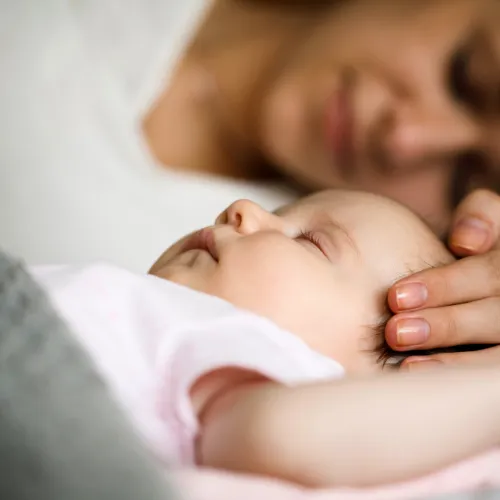Welcome to Time To Sleep
Improve the quality of sleep for both your child and
family with expert sleep solutions tailored to your needs.

Your Journey toward better sleep
We’re a team of Psychologists specialising in sleep support for babies and children aged 6 months through to adolescence. Whether you're navigating bedtime battles, night time wakings, or early morning rising, we’re here to help.
At Time to Sleep, we understand that every family is unique, which is why we create individualised sleep plans tailored to your child's needs. Drawing on our expertise in Health Psychology, child development, and behaviour change science, we provide kind, effective, and evidence-based support to help your child sleep better, so your whole family can enjoy a peaceful night’s sleep.
Let’s work together to build healthy sleep habits that last and help your whole family get the rest you deserve.
Get to know the people who make Time To Sleep…
Our Team

Dr Sarah Jane Besser
Psychologist & Sleep Practitioner
Hi, I’m Sarah Jane, a Health Psychologist, qualified Infant and Child Sleep Practitioner and mother and I’m passionate about supporting families with all aspects of health and wellbeing, with a special focus on helping babies, children, and parents get the restorative sleep they need to thrive.
With a background in child development and health, I’ve worked closely with parents to improve sleep, strengthen parent-child bonding, and build healthy routines that support emotional and physical wellbeing.
I hold a Doctorate in Health Psychology and am registered with the Health and Care Professions Council (HCPC). I’m also a Level 6 Advanced Paediatric Sleep Practitioner, with additional training in parent-led CBTi (Cognitive Behavioural Therapy for Insomnia). As a member of the World Sleep Society, I stay up to date with the latest evidence and best practice in sleep science.
As a parent, I’ve experienced first-hand the challenges of supporting a child through sleep difficulties. That personal journey is what sparked my dedication to this work, helping families like yours find kind, effective sleep solutions that truly make a difference.

Dr Paul Williams
Psychologist & Author
Hi, I’m Paul, a Psychologist, author, and dad with a passion for supporting families in two key areas: infant sleep and meditation. I offer evidence-based advice, one-to-one support, and develop tailored programmes to help you and your family achieve better sleep, greater calm, and improved overall wellbeing.
I hold a PhD in Health Psychology and have worked across a broad range of chronic health conditions in both clinical and academic settings, including the NHS, private research facilities, and several leading London universities. I’ve also completed specialist training in paediatric sleep for healthcare professionals, and bring that knowledge into everything I do.
As a Chartered Psychologist and member of the British Psychological Society, I stay committed to the highest standards of research and practice. My work has been published in top medical journals, including the BMJ and The Lancet, and I continue to write and speak about the science behind sleep, meditation, and health behaviour change.
Whether you're looking for practical support or deeper insight, I’m here to help you find calm, rest, and balance, both for yourself and your family.


Book a free discovery call
Free 30-minute call to provide an introduction and discuss your needs and make sure you are happy to work with us prior to proceeding with any of the following Packages. For all packages, in person support is available (with additional fees for travel, within Hertfordshire and surrounding areas)
Our Support Includes:
Night Time Wakings
Sleep Training
Parenting Help
Sleep Associations
Cry-It-Out Help
Multiple Night Wakings
Short or Inconsistent Naps
Bedtime Battles
Bedtime Routines
Dealing With Night Time Wakings
Early Morning Rising
Evidence Based Support
Night Time Wakings
Sleep Training
Parenting Help
Sleep Associations
Cry-It-Out Help
Multiple Night Wakings
Short or Inconsistent Naps
Bedtime Battles
Bedtime Routines
Dealing With Night Time Wakings
Early Morning Rising
Evidence Based Support
Sleep Training
Sleep training helps your baby build healthy sleep habits, ensuring better rest for the whole family. Our gentle approach supports both you and your child.
Night Wakings
Night wakings can disrupt the whole family’s sleep. Our gentle methods help your baby settle and sleep through the night, improving rest for everyone.
Parent Help
Our Parent help service offers guidance and support, helping you navigate your child's sleep challenges with confidence and care.
Coaching
Night wakings can disrupt the whole family’s sleep. Our gentle methods help your baby settle and sleep through the night, improving rest for everyone.
Sleep Training
Sleep training helps your baby build healthy sleep habits, ensuring better rest for the whole family. Our gentle approach supports both you and your child.
Night Wakings
Night wakings can disrupt the whole family’s sleep. Our gentle methods help your baby settle and sleep through the night, improving rest for everyone.
Parent Help
Our Parent help service offers guidance and support, helping you navigate your child's sleep challenges with confidence and care.
Night Wakings
Night wakings can disrupt the whole family’s sleep. Our gentle methods help your baby settle and sleep through the night, improving rest for everyone.
Is sleep training right for my child?
Parents often worry that sleep training may harm their child or the parent-child relationship, with social media sometimes shaming those who choose it.
At Time to Sleep, we are trained sleep practitioners with healthcare backgrounds, and the latest research shows no evidence that sleep training harms babies. In fact, studies show no negative effects on children or the parent-child bond, even years later. Sleep training offers numerous benefits, including better rest for the whole family, improved health and wellbeing and school performance.
A common misconception is that sleep training involves leaving a child to cry for long periods. However, our gentle approach ensures a method that suits both you and your child.
If you’re unsure whether sleep training is right for your family, contact us for a free 30 minute consultation. We're here to help.

We'd Love to hear from you!
Have a question, comment, or need assistance? We're here to help. Feel free to reach out to us using any of the options below, and a member of our team will get back to you as soon as possible.
+44 (0)7739 339 719
London Based
FAQs
Welcome to our FAQs section! We’ve compiled answers to the most commonly asked questions about Time to Sleep to help you better understand how our service works. If you have additional questions,
feel free to contact us directly.
What can I do to make sure my infant is as safe as possible during sleep training or support?
We recommend that all parents of infants and toddlers refer to and follow the safe sleep guidelines outlined by the lullaby trust.
Safer-sleep-for-babies-a-guide-for-parents-web.pdf (lullabytrust.org.uk)
What age group do you work with?
6 months- 16 year olds.
Do you respond to emails?
We will respond to your emails within 48 hours of contact. We will respond sooner where this is possible.
My infant/child has medical issues and/or additional needs, can you help us?
We are trained to include this as part of our assessment. We will ask about this during our introductory call, and advise at this point.
Will I need to leave my child to cry?
While we do not usually recommend the ‘cry-it-out’ method, sleep training involves making changes to your child’s routine at bedtime, which can involve some crying and protests. However, all our recommended methods are tailored to your child’s individual needs and are based on evidence-based interventions. Our assessment includes questions about your child’s temperament which will help us to determine the right sleep training programme to meet your child’s needs.
What if I require more support after 4 weeks?
This is not usually the case, however, if further support is needed you will have the option to purchase additional hours.
I feel very unsure about whether sleep training is right for my child
Please contact us for an initial call, there will be support with your decision and no pressure to work with us if this is not right for you, your child and family.
Will my child need to be directly involved in the program?
This depends upon the age of the child and the presenting problem. Many of our programs are parent-led with our support, however, there are times when it might be more beneficial to involve the child and then this will be considered. For example, if a child is experiencing worries which interfere with their sleep, the program will likely be most beneficial if the child also comes to sessions.
Still have questions?
If you didn’t find the answer you were looking for, we’re here to help! Reach out to us and we’ll get back to you as soon as possible.


